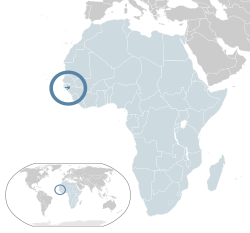Bissau-Guinean
|
Republic of Guinea-Bissau
República da Guiné-Bissau (Portuguese)
|
|||||
|---|---|---|---|---|---|
|
|||||
|
Motto:
"Unidade, Luta, Progresso" (Portuguese) "Unity, Fight, Progress" |
|||||

Location of Guinea-Bissau (dark blue)
– in Africa (light blue & dark grey) |
|||||
| Capital and largest city |
Bissau 11°52′N 15°36′W / 11.867°N 15.600°W |
||||
| Official languages | Portuguese | ||||
| Recognised national languages | Upper Guinea Creole | ||||
| Ethnic groups | |||||
| Demonym | Bissau-Guinean | ||||
| Government | Unitary semi-presidential republic | ||||
| José Mário Vaz | |||||
| Umaro Sissoco Embaló | |||||
| Legislature | National People's Assembly | ||||
| Independence from Portugal | |||||
|
• Declared
|
24 September 1973 | ||||
|
• Recognized
|
10 September 1974 | ||||
| Area | |||||
|
• Total
|
36,125 km2 (13,948 sq mi) (136th) | ||||
|
• Water (%)
|
22.4 | ||||
| Population | |||||
|
• 2014 estimate
|
1,693,398 (148th) | ||||
|
• Density
|
46.9/km2 (121.5/sq mi) (154th) | ||||
| GDP (PPP) | 2016 estimate | ||||
|
• Total
|
$2.851 billion | ||||
|
• Per capita
|
$1,568 | ||||
| GDP (nominal) | 2016 estimate | ||||
|
• Total
|
$1.168 billion | ||||
|
• Per capita
|
$642 | ||||
| Gini (2002) | 35 medium |
||||
| HDI (2015) |
low · 178th |
||||
| Currency | West African CFA franc (XOF) | ||||
| Time zone | GMT (UTC+0) | ||||
| Drives on the | right | ||||
| Calling code | +245 | ||||
| ISO 3166 code | GW | ||||
| Internet TLD | .gw | ||||
– in Africa (light blue & dark grey)
– in the African Union (light blue)
Guinea-Bissau (![]() i/ˈɡɪni bɪˈsaʊ/, GI-nee-bi-SOW), officially the Republic of Guinea-Bissau (Portuguese: República da Guiné-Bissau, pronounced: [ʁeˈpublikɐ dɐ ɡiˈnɛ biˈsaw]), is a country in West Africa. It covers 36,125 square kilometres (13,948 sq mi) with an estimated population of 1,704,000.
i/ˈɡɪni bɪˈsaʊ/, GI-nee-bi-SOW), officially the Republic of Guinea-Bissau (Portuguese: República da Guiné-Bissau, pronounced: [ʁeˈpublikɐ dɐ ɡiˈnɛ biˈsaw]), is a country in West Africa. It covers 36,125 square kilometres (13,948 sq mi) with an estimated population of 1,704,000.
Guinea-Bissau was once part of the kingdom of Gabu, as well as part of the Mali Empire. Parts of this kingdom persisted until the 18th century, while a few others were under some rule by the Portuguese Empire since the 16th century. In the 19th century, it was colonized as Portuguese Guinea. Upon independence, declared in 1973 and recognised in 1974, the name of its capital, Bissau, was added to the country's name to prevent confusion with Guinea (formerly French Guinea). Guinea-Bissau has a history of political instability since independence, and no elected president has successfully served a full five-year term.
...
Wikipedia


